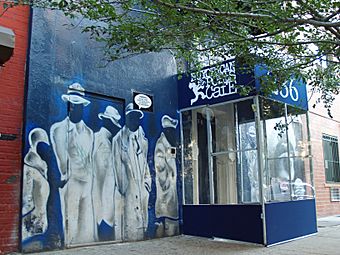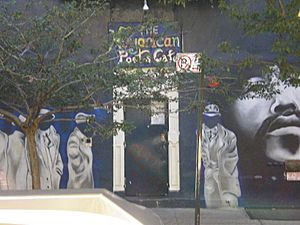Nuyorican Poets Café facts for kids

Nuyorican Poets Cafe building on East 3rd St. in Alphabet City
|
|
| Address | 236 East 3rd Street |
|---|---|
| Location | New York City |
| Coordinates | 40°43′19″N 73°58′54″W / 40.721951°N 73.9817816°W |
| Public transit | Second Avenue |
| Opened | 1975 |
The Nuyorican Poets Cafe is a special place in New York City. It is a nonprofit organization, meaning it works for a good cause, not just for money. The Cafe is located in a part of Manhattan called Alphabet City.
It is a very important spot for the Nuyorican art movement. "Nuyorican" means Puerto Rican New Yorkers. The Cafe is a place where people can share poetry, music, hip hop, video, visual arts, comedy, and theater. It also hosts events for the PEN World Voices festival.
The Cafe helps Nuyorican artists share their ideas. These ideas are about community, understanding, and breaking down barriers. They want to spread these messages beyond the Cafe itself.
Contents
History of the Nuyorican Poets Cafe
The Nuyorican Poets Cafe started around 1973. It began in the East Village apartment of Miguel Algarín. He was a writer, poet, and professor. Other co-founders included Miguel Piñero, Bimbo Rivas, Pedro Pietri, and Lucky Cienfuegos.
By 1975, many poets wanted to join. The apartment became too small. So, Algarín rented a pub called the Sunshine Café. They renamed it "The Nuyorican Poets Cafe." Many famous poets performed there in the 1970s. These included Miguel Algarín, Miguel Piñero, and Pedro Pietri.
By 1980, even more people wanted to visit. The Cafe bought its current building on East 3rd Street. This allowed them to grow their activities and programs. New poets like Nancy Mercado and Giannina Braschi also became popular there.
The Nuyorican Poets Cafe has had many important people. These include Bob Holman and Saul Williams. They helped lead poetry slam events. Co-founder Algarín explained the Cafe's main idea. He said: "We must listen to one another. We must respect one another's habits and we must share the truth."
In the 1990s, new Nuyorican poets performed. In 2008, Daniel Gallant became the executive director.
The Open Room: A Place for Artists
The "Open Room" was a main idea for the Cafe from the start. It was a place where poets and artists could share their work. They could perform for an audience. It is now a weekly event at the Cafe. Many poets come and sign up to perform.
In the early days, a special Nuyorican chant was used. It helped people get ready to listen to the poetry. It created a quiet mood after dancing.
The Open Room shows what the Cafe is all about. It is open to everyone. It is a welcoming place where anyone can perform. Everyone at the Cafe is meant to listen and support.
Nuyorican Poetry and Plays at the Cafe
Puerto Rican poets in New York were very involved in politics. This was before the Cafe even started (1964-1974). Their poetry talked about their own history. It broke old poetry rules. It focused on identity and how people are seen.
The Cafe was closed from 1982 to 1989. But Nuyorican poetry still grew during this time. It became a key part of Latin American literature in the United States. More books were published. This poetry was studied as an example of different cultures coming together.
Nuyorican poetry and plays are part of the Nuyorican movement. The Cafe was, and still is, a place for performing this art. Performing and having the audience involved was very important. The Cafe helped make the Nuyorican movement strong. It showed how important it is for people to be seen and heard.
Bob Holman helped bring poetry slam nights to the Nuyorican. He wanted the Cafe to be a community place. He knew slam poetry was active and connected people. Miguel Algarín, the founder, agreed. Slam poetry nights brought big crowds and media attention. This helped the Cafe and Nuyorican art reach new people.
The Nuyorican Poets Cafe's works share common themes. These include identity, belonging, tolerance, and understanding. They also talk about being seen and represented. Miguel Algarín edited a book of plays from the Cafe. He grouped them by themes. These included city life, politics, gender, and hip hop. These are big ideas in the Nuyorican movement.
Algarín also co-edited a book of Nuyorican poetry from the Cafe. This book showed how themes changed over time. In the 1990s, Nuyorican poetry focused on breaking down barriers. These included political, social, and racial differences. In the early 2000s, slam poetry became very popular. It showed that poetry could be a living, easy-to-access art form.
The Cafe in Popular Culture
In 1994, a short film was made about the Nuyorican Poets Cafe. It was called Nuyorican Poets Cafe. Ray Santisteban directed it. It featured founder Miguel Algarín and other poets. The film won "Best Documentary" in 1995.
Also in 1994, Miguel Algarín and Bob Holman edited a poetry collection. It featured poems from the Cafe. Algarín said the Cafe's main goal was to show poetry as a living art form. This book showed the poetry from the 1990s and early 2000s.
In 1996, a longer film called SlamNation was made. It was about the Nuyorican Poets Cafe Poetry Slam Team. Paul Devlin directed it. The film followed Bob Holman and the 1996 Nuyorican team. They competed in the National Poetry Slam.
In 1997, another collection of works was published. This one focused on plays and monologues. These came from the Nuyorican Poets Cafe Theater Festival. This collection showed shared themes of the Nuyorican movement.
The 1998 novel Yo-Yo Boing! by Giannina Braschi includes a scene at the Cafe. It shows a poetry reading in Spanglish. Founder Pedro Pietri is also a character in the book.
León Ichaso's 2001 film Piñero shows scenes of poetry readings. These are by Miguel Piñero. At the end of the film, Cafe founders and poets gather. They scatter Piñero's ashes in the Lower East Side.
In 2018, PBS NewsHour featured the Cafe. This was after Hurricane Maria hit Puerto Rico. The special was called "After Hurricane Maria, Puerto Rican poets ask again what it means to belong." It showed poets reading at the Cafe.
List of Poets, Artists, and Musicians
Spoken word
Many important poets have performed at the Nuyorican Poets Cafe. These include voices from the Nuyorican, Latino poetry, and other American poetry movements:
- Miguel Algarín, Founder
- Paul Beatty
- Amiri Baraka
- Giannina Braschi
- Malkia Cyril
- Cheryl B and Daniel Dumile
- Sandra María Esteves
- Shaggy Flores
- La Bruja/Caridad de la Luz
- Tato Laviera
- Jesús Papoleto Meléndez
- Nancy Mercado
- Willie Perdomo
- Pedro Pietri
- Miguel Piñero
- Ishmael Reed
- Carl Hancock Rux
- Ntozake Shange
- Edwin Torres
- Emanuel Xavier
Music
The Nuyorican Poets Cafe also hosts music events. These include Latin Jazz, Reggaeton, Hip Hop, and Salsa. Performers have included:
- Zoraida Santiago
- The Bronx Conexión
- Val Ramos
- Danny Rivera
In June 2002, Val Ramos opened for Danny Rivera. MF Doom also performed open mic events at the Cafe.
Visual arts
The Nuyorican Poets Cafe shows art by local Latino artists. These exhibitions have featured:
- Juan Sanchez
- Rafael Tufino Jr.
- Esperanza Cortez
- Manuel Rivera-Ortiz
See also
 In Spanish: Nuyorican Poets Café para niños
In Spanish: Nuyorican Poets Café para niños
 | Selma Burke |
 | Pauline Powell Burns |
 | Frederick J. Brown |
 | Robert Blackburn |


